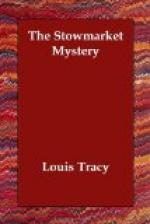“It has not been cleaned,” he said.
“No, it was left untouched after the doctor withdrew it from the poor young fellow’s breast.”
Brett produced a magnifying glass. Beneath the rust on the blade he thought he could distinguish some Japanese characters in the quaint pictorial script adapted by that singular people from the Chinese system of writing.
He brought the knife nearer to the window and carefully focussed it. Then he produced a note-book and made a pencil drawing of the following inscription:
[Illustration]
Winter watched him with quiet agony. He had never noticed the signs before.
“Mr. Okasaki did not tell you what these scratches meant?” inquired the barrister.
“No. He did not see them.”
“Sure?”
“Quite positive. Of course, it is very smart on your part to hit upon them so quickly, but what possible purpose can it serve to find out the meaning of something carved in Japan more than fifty years ago, at the very least?”
“I do not know. It is very stupid of me, I admit, but I have not the faintest notion.”
“Does it make the finding of Okasaki more important?”
“To a certain extent. We want to have everything explained. At present we have so little of what I regard as really definite evidence.”
“May I ask what that little is?”
“Sir Alan Hume-Frazer was murdered with a knife produced by a man like David Hume, whom ‘Rabbit Jack’ saw standing beneath the yews. Not much, eh?”
Winter shook his head dubiously.
“If Sir Alan were shot instead of stabbed,” went on the barrister, “the first thing you would endeavour to determine would be the calibre and nature of the bullet. Why not be equally particular about the knife?”
“But this weapon has been for fifty years in Glen Tochan. Its history is thoroughly established.”
“Is it? Who made it? Whose crest does it bear? What does this motto signify? If you wanted to kill a man would you use this toy? Why was not the sword itself employed?”
“That string of questions leaves me out, Mr. Brett.”
“I am equally uninformed. I can only answer the last one. The sword is intended for suicidal purposes, the Ko-Katana for an enemy. This is a case of murder, not suicide.”
The detective wheeled sharply on his heels, thereby upsetting Charles Peace’s telescopic ladder.
“You suspect Okasaki!” he cried.
“My dear fellow! Okasaki is, say, five feet nothing. The murderer is five feet ten inches in height. Japanese are clever people, but they are not—telescopes,” and he picked up the ladder.
Winter grinned. “You always make capital out of my blunders,” he said.
“Pooh! My banking account is limited. Let us go. The moral atmosphere in this room is vile.”
Outside the Central Police Office they separated, Brett to pay some long-neglected calls, Winter to hunt up Capella’s movements and initiate inquiries about Okasaki.




